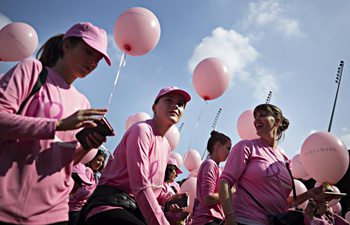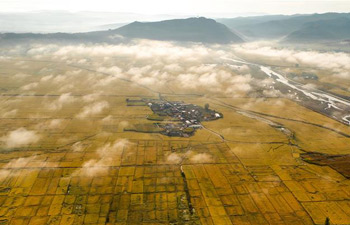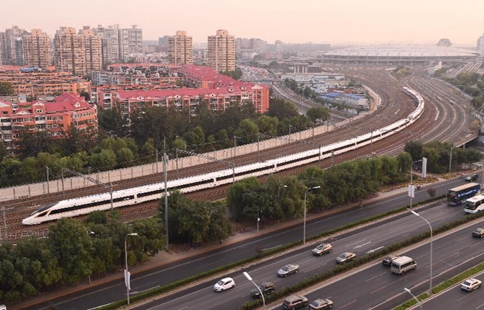
German Chancellor candidate of the Social Democratic Party (SPD) Martin Schulz (R, Front) greets supporters after delivering a speech at the headquarters of SPD in Berlin, Germany, on Sept. 24, 2017. (Xinhua/Shan Yuqi)
By Tian Ying
BERLIN, Sept. 25 (Xinhua) -- Two hours after the first exit poll of German federal election manifested the disappointing 20 percent of votes for the center-left Social Democratic Party (SPD), still many are watching a live discussion on TV among leaders of major parties, in the headquarter of the runner-up.
The audience suddenly burst into laughter, with some even clapping their hands. Later, one from the audience explained to Xinhua they laughed when Martin Schultz, chairman of SPD, stopped the moderator and said he wanted to say something.
Because Schultz was criticized for following too much the moderator's questions back in his televised electoral debate with Merkel, so people felt it's nice that he finally took initiative and expressed what the Party wanted to say this time, said Gerhard Stahl, an SPD member in the audience.
"Although it's too late for the debate, but not too late for the Party," said Stahl, a Berliner who has become an SPD member since 1970s, also professor in Brussels-based College of Europe, as he saw the bright side which is the Party's decision to jettison the Grand coalition (CDU/CSU plus SPD), despite the Party's garnering the lowest vote since World War II.
"In a big coalition government, it's very difficult to show your own contribution as a junior Party," Stahl expressed his idea about the main cause of the setback. "Success will go to the chancellor and problems are shared by everybody."
His opinion was echoed by Lisa Price, official of SPD's state commission in Brandenburg, who deemed the development as "a win, not a loss" for the SPD, as the SPD finally got an opportunity to "re-profile" itself, or making the Party's characteristics -- obscured in the Grand Coalition -- distinct again.
"We have been a junior partner of a stronger Party, and therefore we cannot focus on people, but the coalition and our partner, that is why SPD didn't get the vote as we expected, "said Price.
"Now we can profile our politics, and we have to be very clear what our politics are. We need to create our own picture. When we have this picture, people will start believing us again," Price said.
She also listed the agenda that she thought the Party should bend over in the forthcoming years in order to re-profile, including addressing wealth gap by raising the lower income, and delivering welfare for pensioners.
"Old people work for 40 years and go to retirement without enough money to pay their rent and food. It's a disgrace for Germany and we have to change that."
Stahl hoped that his Party could strive to close the yawning wealth gap, focus on social topics and strengthen Europe as it develops its role as an opposition party.
"Populist parties and even some conservative parties are saying there is a national answer, but the challenge is that there is no national answer, there should be an European or even a global answer," said the professor, adding, "for example China supported the climate objectives in Paris. Big countries have to cooperate."
"America First, Britain First or Germany First is not a policy answer, and only working together can solve problems," Stahl said.
Nele, a 21-year-old social science student in Malburg, also a member of the youth organization of the SPD, said young members including herself are very sad about the result as they have spent the past month distributing flyers and doing hard work for the campaign.
What disappointed her more and also confused her was the above-expected vote going to the far-right party Alternative fuer Deutschland (AfD), which unexpectedly made a historical breakthrough with 13.5 percent of votes, and became the third strongest party in the parliament.
Price described the result concerning the AfD as "depressing and shocking".
"I have no idea what we can do to educate the people. This is the wrong way to go and it only brought us suffering, death and poverty."
Nele, pointing to her bag featuring a slogan "good life without Nazis", said, "This is something the SPD should fight for."















